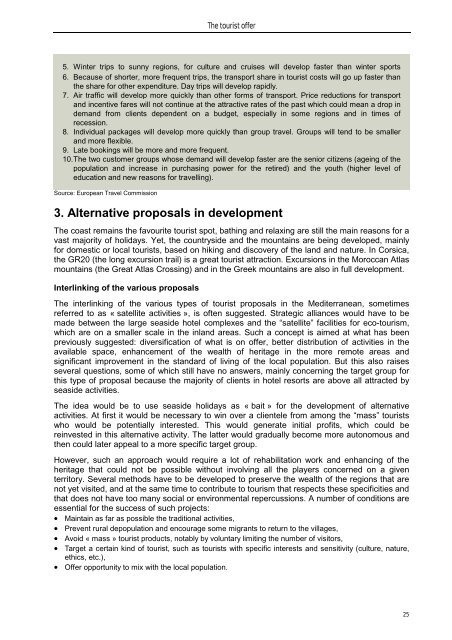dossier sur le tourisme et le développement durable
dossier sur le tourisme et le développement durable
dossier sur le tourisme et le développement durable
You also want an ePaper? Increase the reach of your titles
YUMPU automatically turns print PDFs into web optimized ePapers that Google loves.
The tourist offer<br />
5. Winter trips to sunny regions, for culture and cruises will develop faster than winter sports<br />
6. Because holidays. There of shorter, is also more growing frequent demand trips, for the rural transport holidays. share in tourist costs will go up faster than<br />
the share for other expenditure. Day trips will develop rapidly.<br />
7. Air traffic will develop more quickly than other forms of transport. Price reductions for transport<br />
and incentive fares will not continue at the attractive rates of the past which could mean a drop in<br />
demand from clients dependent on a budg<strong>et</strong>, especially in some regions and in times of<br />
recession.<br />
8. Individual packages will develop more quickly than group travel. Groups will tend to be smal<strong>le</strong>r<br />
and more f<strong>le</strong>xib<strong>le</strong>.<br />
9. Late bookings will be more and more frequent.<br />
10. The two customer groups whose demand will develop faster are the senior citizens (ageing of the<br />
population and increase in purchasing power for the r<strong>et</strong>ired) and the youth (higher <strong>le</strong>vel of<br />
education and new reasons for travelling).<br />
Source: European Travel Commission<br />
3. Alternative proposals in development<br />
The coast remains the favourite tourist spot, bathing and relaxing are still the main reasons for a<br />
vast majority of holidays. Y<strong>et</strong>, the countryside and the mountains are being developed, mainly<br />
for domestic or local tourists, based on hiking and discovery of the land and nature. In Corsica,<br />
the GR20 (the long excursion trail) is a great tourist attraction. Excursions in the Moroccan Atlas<br />
mountains (the Great Atlas Crossing) and in the Greek mountains are also in full development.<br />
Interlinking of the various proposals<br />
The interlinking of the various types of tourist proposals in the Mediterranean, som<strong>et</strong>imes<br />
referred to as « satellite activities », is often suggested. Strategic alliances would have to be<br />
made b<strong>et</strong>ween the large seaside hotel comp<strong>le</strong>xes and the “satellite” facilities for eco-tourism,<br />
which are on a smal<strong>le</strong>r sca<strong>le</strong> in the inland areas. Such a concept is aimed at what has been<br />
previously suggested: diversification of what is on offer, b<strong>et</strong>ter distribution of activities in the<br />
availab<strong>le</strong> space, enhancement of the wealth of heritage in the more remote areas and<br />
significant improvement in the standard of living of the local population. But this also raises<br />
several questions, some of which still have no answers, mainly concerning the targ<strong>et</strong> group for<br />
this type of proposal because the majority of clients in hotel resorts are above all attracted by<br />
seaside activities.<br />
The idea would be to use seaside holidays as « bait » for the development of alternative<br />
activities. At first it would be necessary to win over a cliente<strong>le</strong> from among the “mass” tourists<br />
who would be potentially interested. This would generate initial profits, which could be<br />
reinvested in this alternative activity. The latter would gradually become more autonomous and<br />
then could later appeal to a more specific targ<strong>et</strong> group.<br />
However, such an approach would require a lot of rehabilitation work and enhancing of the<br />
heritage that could not be possib<strong>le</strong> without involving all the players concerned on a given<br />
territory. Several m<strong>et</strong>hods have to be developed to preserve the wealth of the regions that are<br />
not y<strong>et</strong> visited, and at the same time to contribute to tourism that respects these specificities and<br />
that does not have too many social or environmental repercussions. A number of conditions are<br />
essential for the success of such projects:<br />
• Maintain as far as possib<strong>le</strong> the traditional activities,<br />
• Prevent rural depopulation and encourage some migrants to r<strong>et</strong>urn to the villages,<br />
• Avoid « mass » tourist products, notably by voluntary limiting the number of visitors,<br />
• Targ<strong>et</strong> a certain kind of tourist, such as tourists with specific interests and sensitivity (culture, nature,<br />
<strong>et</strong>hics, <strong>et</strong>c.),<br />
• Offer opportunity to mix with the local population.<br />
25
















